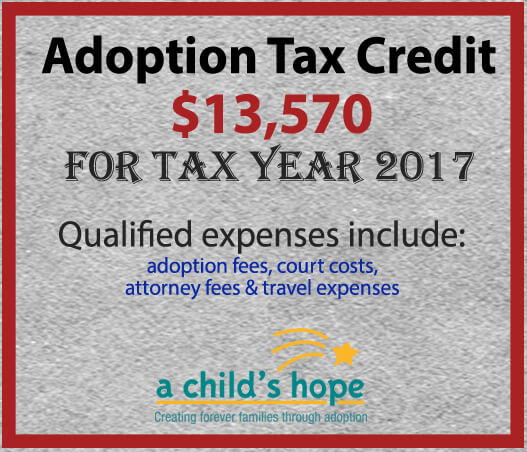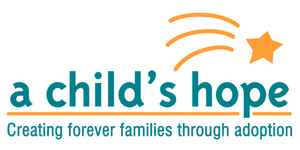Adoptive parents get a substantial boost from the federal government in the form of a $13,570 adoption tax credit. If you adopted in 2017, before you file your 2017 taxes, make sure that you and your tax preparer understand the Federal Adoption Tax Credit. You may also be able to amend a previous year’s return if you had expenses related to adoption, but didn’t claim them.
 The bottom line is that if your modified adjusted gross income is below $203,540 you are eligible to receive the full adoption tax credit, and the credit can be spread out over five years. With the average cost of a domestic adoption at $36,000, this tax credit covers more than a third of your costs.
The bottom line is that if your modified adjusted gross income is below $203,540 you are eligible to receive the full adoption tax credit, and the credit can be spread out over five years. With the average cost of a domestic adoption at $36,000, this tax credit covers more than a third of your costs.
There are “fine points” in the adoption tax credit. So, you are encouraged to consult with a tax preparer who is familiar with the provisions.
What Does the Adoption Tax Credit Cover?
The tax credit is designated to offset real expenses associated with the adoption of a child, other than a spouse’s child. Eligible expenses include:
- Reasonable and necessary adoption fees
- Court costs and attorney fees
- Traveling expenses (including amounts spent for meals and lodging while away from home)
- Other expenses that are directly related to and for the principal purpose of the legal adoption of an eligible child.
How Much is the Adoption Tax Credit?
The credit is per child, the maximum that can be claimed depends on the number of children adopted. The credit adjusts for inflation every year. For 2017, the credit is $13,570 per child non-refundable*
*Nonrefundable means the tax credit is limited to the taxpayer’s tax liability for that year. However, any credit in excess of the tax liability may be carried forward for up to five years.
When Can the Adoption Tax Credit be Taken?
For domestic adoptions, (a child who is a citizen or resident of the U.S. or its possessions before the adoption effort begins):
- Qualified adoption expenses paid before the year the adoption becomes final are allowable as a credit for the tax year following the year of payment (even if the adoption is never finalized, and even if an eligible child was never identified).
- Qualified adoption expenses paid during or after the year the adoption becomes final are allowable as a credit for the year of payment.
- Eligible tax credit amounts claimed, but not redeemable due to the taxpayer’s tax liability being less than the value of the tax credit, can roll over to the following year (up to 5 years).
What are Some of the Limitations of the Adoption Tax Credit?
The income limit on the adoption credit is based on the taxpayer’s modified adjusted gross income (MAGI).
- If your MAGI amount is below $203,540 for 2017, your credit will not be affected
- If your MAGI amount for 2017 falls between $203,540 and $243,539 will be subject to a phase-out reduction
- Taxpayers with income in excess of $243,539 are not eligible to receive any adoption tax credit from the federal government
The dollar limits for any single adoption effort is:
- The maximum cumulative Adoption Tax Credit claimed for any single adoption effort cannot exceed the maximum value of the Adoption Tax Credit for the year the adoption becomes final. For example:
- If an adoption became final in 2017;
- And a $3,000 credit was claimed 2016 for qualified expensed incurred in 2015 in connection with the 2017 adoption;
- Then the maximum credit that can be claimed in 2017 is $10,570
(2017:$13,570 dollar limit, less $3,000 of qualified adoption expenses claimed previously)
Filing status limit – The filing status of Married Filing Separately is not eligible for the Adoption Tax Credit.
What if My Employer provides Adoption Assistance?
The taxpayer may be able to claim both the tax credit and an income exclusion for qualified expenses. However, you must claim any allowable exclusion before claiming any allowable credit. Expenses used for the exclusion reduce the qualified adoption expenses available for the credit. As a result, you can’t claim both a credit and an exclusion for the same expenses.
What if I Was Previously Eligible for the Adoption Tax Credit and Did Not Claim it in the Year of Eligibility?
A taxpayer may be eligible to file an amended return to claim the Adoption Tax Credit for previous years. Consult a qualified tax attorney, CPA or licensed tax professional to determine specific eligibility.
To learn more about the Adoption Tax Credit visit the IRS website at https://www.irs.gov/taxtopics/tc607.
To file for the Adoption Tax Credit complete Form 8839.pdf, Qualified Adoption Expenses, using Form 8839 Instructions.
The information contained in this article is for general knowledge purposes only. Individuals interested in claiming any tax credit should consult a qualified tax professional to determine specific eligibility and amounts.
To learn more about the adoption laws in North Carolina, click here.
